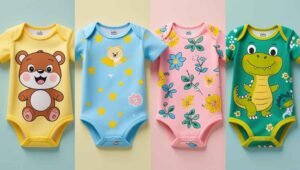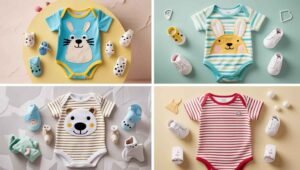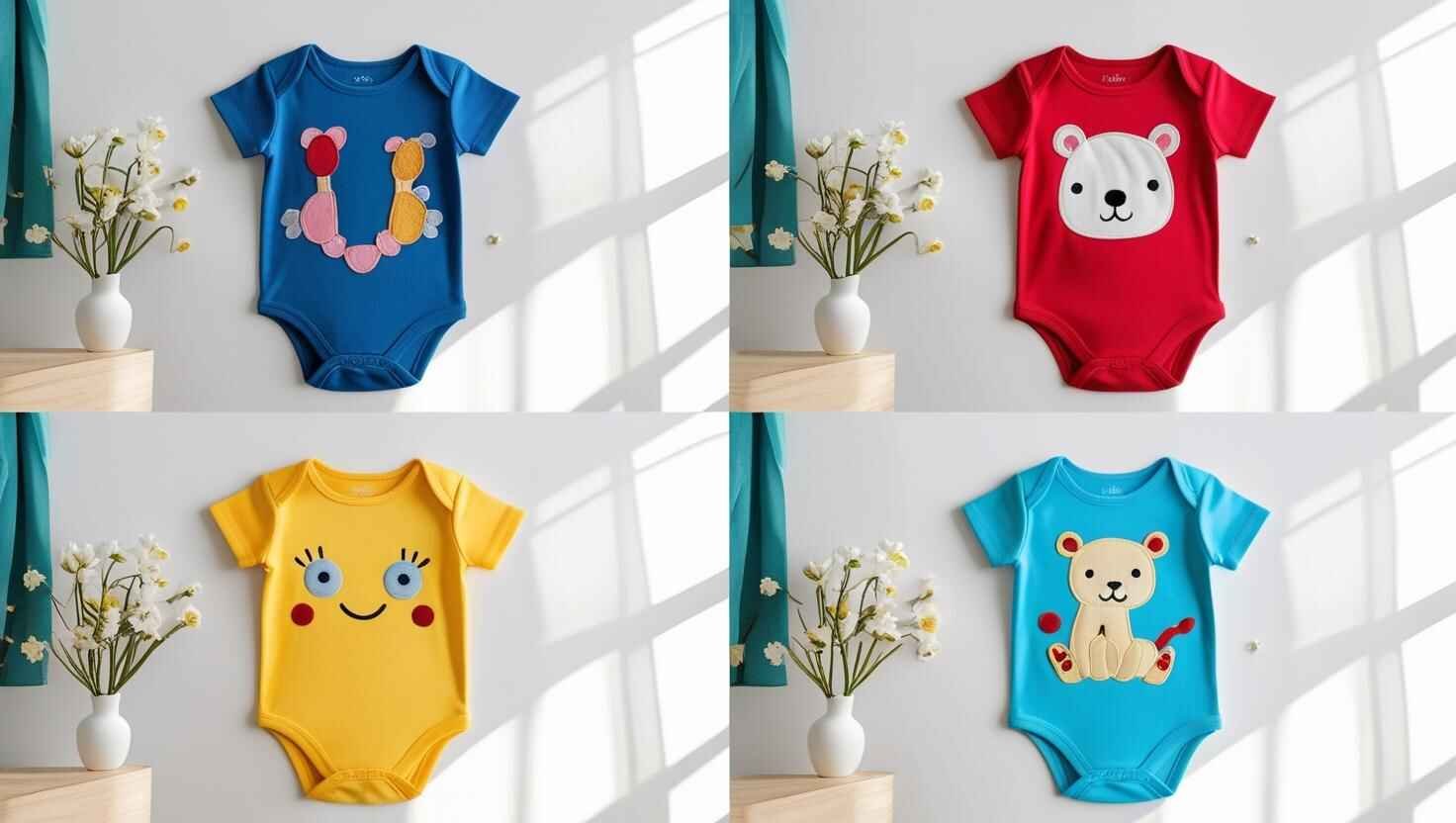When it comes to dressing your baby, comfort and safety come first. But with so many cute and colorful options out there, it’s easy to overlook one of the most important things—what’s actually in the fabric your baby is wearing. That’s where organic baby onesies come into play.
Unlike conventional baby clothes, organic onesies are made without harmful chemicals, pesticides, or synthetic dyes. And since a baby’s skin is incredibly sensitive, choosing something natural and non-toxic can really make a difference. From reducing skin irritation to being better for the environment, organic cotton is a smart, feel-good choice.
But let’s be honest—baby clothes can get pricey, and it’s easy to wonder if going organic is really worth it. In this article, we’ll walk through what makes an organic onesie special, what to look for when shopping, and some of the best brands out there today. Whether you’re a new parent, shopping for a baby shower, or just trying to do better by the planet, this guide will help you make an informed (and cozy) choice.
Top Organic Baby Onesies
There are a lot of brands claiming to be organic, so we’ve put together a table comparing some of the most popular ones. This includes fabric type, certifications, price range, and what makes each one stand out.
| Brand | Fabric Type | Certifications | Price Range | Standout Feature |
| Burt’s Bees Baby | 100% Organic Cotton | GOTS Certified | $12–$20 | Widely available, super soft |
| Hanna Andersson Onesie | Organic Cotton | OEKO-TEX, GOTS | $20–$40 | Durable, colorful prints |
| Monica + Andy | Organic Cotton | GOTS Certified | $25–$35 | Handmade feel, great gift packaging |
| Finn + Emma | Organic Cotton | GOTS Certified | $24–$32 | Stylish prints, ethically produced |
| Pact | Organic Cotton | Fair Trade Certified | $10–$25 | Affordable, minimalist style |
| Under the Nile | Organic Egyptian Cotton | GOTS Certified | $18–$30 | Super breathable, made in fair-trade farms |
| L’ovedbaby | Organic Cotton | GOTS Certified | $20–$35 | Snug fit, neutral tones |
So, whether you’re after budget-friendly, colorful, or ethically produced options, there’s something for every parent out there.
What to Look For in Organic Baby Onesies (And Why It Matters)

Shopping for baby clothes might sound simple, but organic onesies come with a few things worth paying attention to. Let’s go over a few of the biggies so you know what to look for the next time you’re browsing.
Fabric Quality
Organic cotton is the go-to, but not all cotton is created equal. Look for onesies that mention “combed” or “ring-spun” cotton—they’re softer and smoother for your baby’s skin. Egyptian or Peruvian Pima cotton? Even better. These are extra-long staple cottons that feel luxurious and last longer.
Certifications Matter
Look for onesies that are GOTS certified (Global Organic Textile Standard). This isn’t just a fancy acronym. GOTS ensures the cotton was grown without synthetic pesticides and processed in a way that’s environmentally and socially responsible.
Other certifications to keep an eye out for:
- OEKO-TEX: Ensures textiles are free of harmful chemicals.
- Fair Trade: Means workers are paid fair wages and treated well.
Fit and Functionality
Let’s be honest—you’re going to change a lot of diapers. Onesies with envelope necks and snap closures at the bottom make that a whole lot easier. Bonus points if they’re machine washable and stay soft after multiple washes.
Colors and Dyes
Bright colors are fun, but harsh dyes? Not so much. Organic brands usually use water-based dyes or natural pigments, which are much gentler on delicate skin.
Sustainability and Ethics
Some brands go above and beyond by using biodegradable packaging, offsetting carbon emissions, or employing artisans under fair labor practices. If you’re already making the switch to organic, it’s worth supporting companies doing good behind the scenes too.
Benefits of Choosing Organic Onesies (And Why Parents Love Them)
Here’s why so many parents are making the switch—and why you might want to as well.
Gentle on Sensitive Skin
Babies are prone to rashes, eczema, and other skin irritations. Since organic onesies don’t use harsh chemicals or synthetic materials, they’re less likely to cause allergic reactions.
Better for the Planet
Organic cotton uses significantly less water and doesn’t involve toxic pesticides or fertilizers. It’s grown in healthier soil and supports more sustainable farming practices.
Durable and Long-Lasting
Organic cotton is often more durable than conventional cotton because it isn’t processed as harshly. That means you can wash and reuse those onesies again and again—maybe even save them for baby #2.
Peace of Mind
Knowing your baby isn’t exposed to potential toxins is a huge relief. And while organic onesies can be a little pricier, many parents say the peace of mind is well worth it.
Stylish and Modern Options
Gone are the days when “organic” meant bland or boring. Today’s organic onesies come in all sorts of adorable designs—from minimalist neutrals to vibrant prints.

FAQs
Are organic baby clothes really better?
Yes, especially for newborns and babies with sensitive skin. Organic baby clothes avoid harmful chemicals, pesticides, and synthetic dyes, making them safer and gentler on delicate skin.
What does GOTS certified mean?
GOTS (Global Organic Textile Standard) certification means the product meets strict environmental and social criteria from farm to finish. It’s one of the highest standards for organic textiles.
Do organic onesies shrink more than regular ones?
Organic cotton can shrink if not pre-washed or dried at high heat. Always check the label. Many organic brands pre-wash their fabrics to prevent shrinkage.
Are organic onesies more expensive?
Generally, yes—but not outrageously so. You’re paying a little more for safer materials, ethical labor, and environmentally friendly practices. Think of it as an investment in your baby’s comfort and future.
Can I find affordable organic baby clothes?
Absolutely. Brands like Burt’s Bees Baby and Pact offer affordable organic options that don’t skimp on quality.
What sizes should I buy?
Babies grow fast, so sizing up isn’t a bad idea. Start with a mix of newborn and 0-3 months, then reassess as your baby grows.
Do organic onesies last longer?
In many cases, yes. Organic cotton is often thicker and more durable, so it can stand up to frequent washing and wear.
Choosing the right onesies for your baby goes beyond just cute patterns or price tags. When you opt for organic, you’re choosing a path that’s kinder to your baby’s skin and gentler on the environment. You’re also supporting ethical labor practices and saying no to harsh chemicals—something we all want to do when it comes to the tiniest people in our lives.
Organic baby onesies aren’t just a trend; they’re a step in the right direction. From affordable favorites like Burt’s Bees Baby to boutique options like Monica + Andy or Finn + Emma, there’s something for every budget and style. And while no onesie can prevent those midnight diaper blowouts, knowing your baby is wrapped in something safe, soft, and sustainable? That’s worth every penny.
So the next time you’re filling your cart or prepping for a baby shower, take a moment to read the label. Your baby (and the planet) will thank you.

